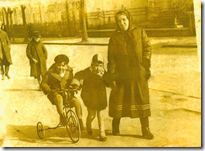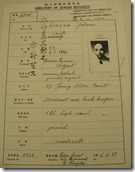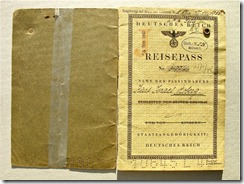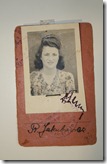 STORIES OF SURVIVAL: HOLOCAUST ARTIFACTS EXHIBIT
STORIES OF SURVIVAL: HOLOCAUST ARTIFACTS EXHIBIT
Tell It To Your Children...Let Them Pass It On From Generation to Generation (Joel 1:3)
WHEN: March 1 – 28; Reception with Survivors and their families: Sunday, March 11, 1-3 PM
WHERE: The Waltuch Gallery at the Kaplen JCC, 411 E. Clinton Ave., Tenafly
Gallery hours are Monday – Thursday, 9 AM – 10 PM; Friday and Sunday, 9 AM – 5 PM; closed Saturday and Jewish holidays.
ADMISSION: free and open to the community.
For more information contact Steve Golden at 201.408.1426.
 The Kaplen JCC on the Palisades will feature a rare display of Holocaust-related artifacts belonging to survivors who are residents of Northern New Jersey. Each artifact in this exhibit—whether a document, a piece of clothing, a photo or a news clipping—tells a powerful story of survival that took place in Germany, France, Holland, Poland, Italy, England and China. The goal of the exhibit is to share these stories in hope of spurring survivors and the public at large to collect and preserve Holocaust artifacts of this kind in museums and other institutions, where they can remain permanently accessible to future generations. (Above: Franciszka (Frania) Sobkowa, nursemaid and housekeeper to the Bienstock family of Drohobycz, Poland, with two of the Bienstock children)
The Kaplen JCC on the Palisades will feature a rare display of Holocaust-related artifacts belonging to survivors who are residents of Northern New Jersey. Each artifact in this exhibit—whether a document, a piece of clothing, a photo or a news clipping—tells a powerful story of survival that took place in Germany, France, Holland, Poland, Italy, England and China. The goal of the exhibit is to share these stories in hope of spurring survivors and the public at large to collect and preserve Holocaust artifacts of this kind in museums and other institutions, where they can remain permanently accessible to future generations. (Above: Franciszka (Frania) Sobkowa, nursemaid and housekeeper to the Bienstock family of Drohobycz, Poland, with two of the Bienstock children)
 Plans for the exhibit were initiated nearly a year ago, when the JCC and Dr. Mordecai Paldiel, a professor at Stern College who is the exhibit’s curator, invited local Holocaust survivors and their families to share their Holocaust-related mementos and personal artifacts in a special exhibition at the JCC. (Left: Johann Sirota, born 1896 in Mikalowska, Podolsk, Ukraine)
Plans for the exhibit were initiated nearly a year ago, when the JCC and Dr. Mordecai Paldiel, a professor at Stern College who is the exhibit’s curator, invited local Holocaust survivors and their families to share their Holocaust-related mementos and personal artifacts in a special exhibition at the JCC. (Left: Johann Sirota, born 1896 in Mikalowska, Podolsk, Ukraine)
“Since a large population of Holocaust survivors live in this area, our hope was to assemble a meaningful assortment of artifacts that could serve as a visible, tangible reminder of what these survivors endured,” says Dr. Paldiel. “Holocaust survivors have now reached the age when they can finally look back and reflect on their and their families’ experience with some sense of peace. Having endured the most horrific experience in human life imaginable, they miraculously garnered the strength to recoup, raise families, and in some cases new families, and become successful in many economic, cultural and social endeavors. Many survivors have saved their passports or visas or photographs from this unforgettable time in history, and we believe that it is vitally important that these items be preserved and viewed and reflected upon…so that they won’t be lost forever.”
 The exhibit, nearly a year in the making, documents the personal stories of seven residents of Bergen County, whose lives were shaped by what they and their parents experienced during the Holocaust. On display are their passports, visas, work permits, travel permits, authentic and false identification cards; photos of themselves or lost loved ones; religious artifacts; and personal items. Each artifact tells a story that will take the viewer back in time to Germany, France, Poland, Lithuania—and even to distant Shanghai, where many Jews fled for safety. And every item serves as an enduring reminder of the strength of the human spirit and its ability to cope with and overcome evil, suffering and adversity. (Above right: The passport belongs to Kurt Roberg.)
The exhibit, nearly a year in the making, documents the personal stories of seven residents of Bergen County, whose lives were shaped by what they and their parents experienced during the Holocaust. On display are their passports, visas, work permits, travel permits, authentic and false identification cards; photos of themselves or lost loved ones; religious artifacts; and personal items. Each artifact tells a story that will take the viewer back in time to Germany, France, Poland, Lithuania—and even to distant Shanghai, where many Jews fled for safety. And every item serves as an enduring reminder of the strength of the human spirit and its ability to cope with and overcome evil, suffering and adversity. (Above right: The passport belongs to Kurt Roberg.)
 “The exhibit represents just a small handful of survivors from among a much larger group living amidst us,” asserts Professor Paldiel. “And yet if we were able to compile them all, they would most likely communicate one important and powerful theme: that even in the aftermath of the unthinkable, survivors found the strength, courage and determination to reassert happy and meaningful lives. This exhibit is living proof of their incredible spirit, and it is my hope, and that of the JCC, to ensure that we remain vigilant against the dangers of prejudice and hatred, and, through exhibits such as this, send a message that freedom and tolerance are not values to be taken for granted, but ones to be constantly asserted and taught to future generations.” (Above left: Rachela Jacobowitz, nee Wolman, born 1924 in Sochaczew, Poland)
“The exhibit represents just a small handful of survivors from among a much larger group living amidst us,” asserts Professor Paldiel. “And yet if we were able to compile them all, they would most likely communicate one important and powerful theme: that even in the aftermath of the unthinkable, survivors found the strength, courage and determination to reassert happy and meaningful lives. This exhibit is living proof of their incredible spirit, and it is my hope, and that of the JCC, to ensure that we remain vigilant against the dangers of prejudice and hatred, and, through exhibits such as this, send a message that freedom and tolerance are not values to be taken for granted, but ones to be constantly asserted and taught to future generations.” (Above left: Rachela Jacobowitz, nee Wolman, born 1924 in Sochaczew, Poland)